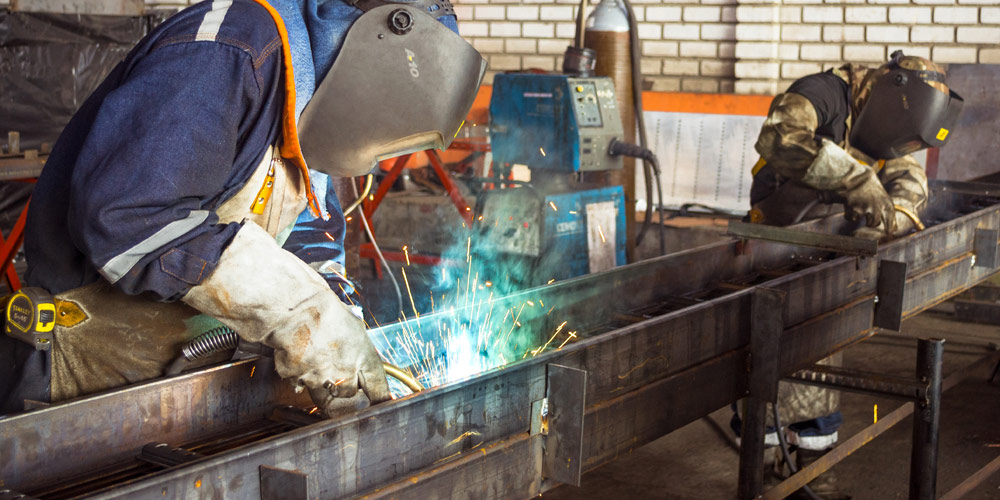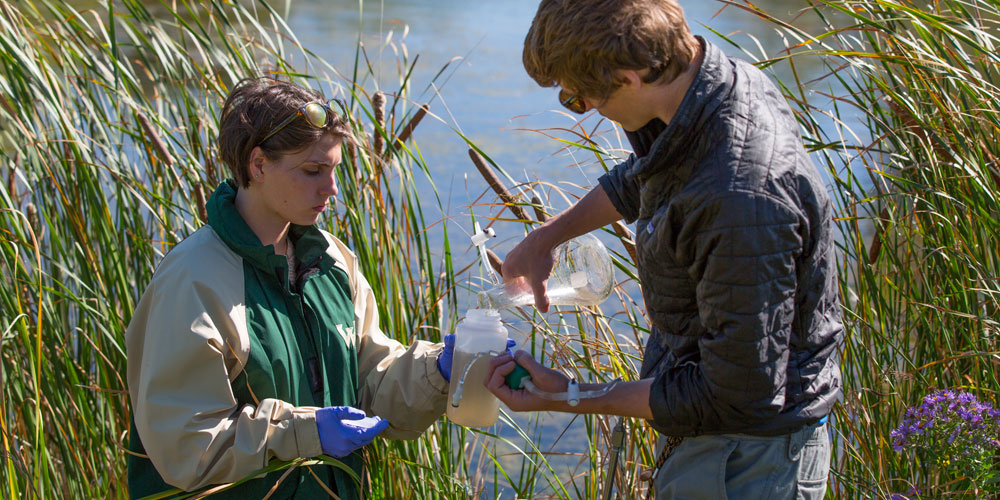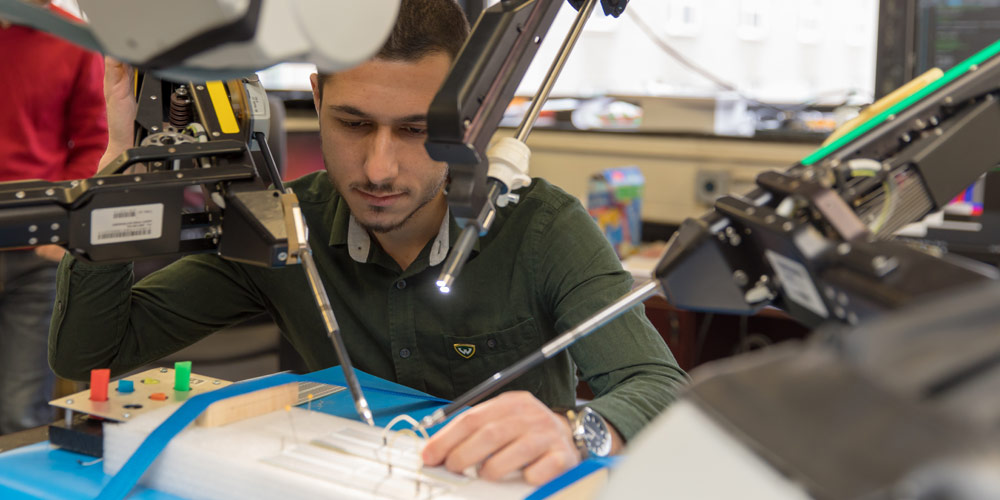WSU College of Engineering rolling out four new degree programs
The Wayne State University College of Engineering is preparing to launch four academic programs that present students with new pathways to develop expertise in traditional and contemporary engineering principles, bridge talent gaps in vital industries, and innovate solutions with significant technological, environmental and economic outcomes.
Wayne State's Board of Governors has approved the following programs: bachelor of science in information technology, bachelor of science in welding and metallurgical engineering technology, master of science in robotics, and master of science in environmental and sustainability engineering.
"Adding these programs allows us to diversify our curricula and remain on the forefront of industrial and societal trends," said College of Engineering Dean Farshad Fotouhi. "Students at Wayne State will greatly benefit from new educational and research opportunities that will ensure relevancy of their skills when they graduate."
All four programs will be available to students beginning in the fall 2020 semester.

B.S. in Information Technology
Wayne State is realigning curricula that was split between three programs in the College of Engineering and the College of Liberal Arts and Sciences, the latter previously offering both a bachelor of arts in computer science and information systems technology. The new streamlined program housed within the College of Engineering's Department of Computer Science will offer an updated and improved degree to more than 900 students with majors across the three programs.
The B.S. in information technology program will incorporate a less mathematically oriented and more applied computing education than its predecessors. It will also simplify advising, reduce time to degree completion for students that decide to change majors within the department and permit greater access to many existing resources, including instructors, courses and computing facilities.
"Through the use of state-of-the-art software and hardware, students will develop their programming skills in order to apply these learned techniques when analyzing an information technology problem, evaluating possible solutions and creating a course of action as part of an organizational development team," said Loren Schwiebert, department chair and associate professor of computer science.
Schwiebert noted that approximately half of the enrollment in his department is composed of transfer students, and that many nearby community colleges offer two-year programs in computer information systems.
"We believe that offering this additional undergraduate degree will benefit a significant fraction of our students as well as attract additional students to our program," said Schwiebert.
The U.S. Bureau of Labor Statistics projects careers in information technology will grow 12% by 2028, faster than the average for all other occupations. The new program will bring supply of IT professionals closer to demand as graduates depart Wayne State well versed in such areas as networking and system administration, web and multimedia content development, database management systems, and web applications.

B.S. in Welding and Metallurgical Engineering Technology
Welders possess the skills to join metals together. Metallurgists have a deep understanding of the properties of metals and employ specific processes to adapt these properties to a particular application.
"Metallurgy and welding are two technologies that have roots in the Industrial Revolution, where the joining of metals began with the forge welding of pig or wrought iron," said Ece Yaprak, chair of the Division of Engineering Technology. "Because of their fundamental nature, these technologies are intertwined."
Over half of all man-made products in the U.S. require the work of welders but, according to the American Welding Society, there will be a shortage of up to 450,000 welding professionals by 2022. As infrastructure ages, new materials emerge and an emphasis on quality in advanced manufacturing increases, developing an influx of skilled workers in this field will be crucial.
As is the case with all programs in the Division of Engineering Technology, the B.S. in welding and metallurgical engineering technology program is an upper two-year curriculum for students who have completed their first two years in a welding or comparable program elsewhere. There are nearly 1,000 students enrolled in welding courses between Oakland, Macomb, Monroe and Washtenaw community colleges, all of which are located within 45 miles of Wayne State's campus in Midtown Detroit. Wayne State is also just the second university in Michigan to offer a four-year degree in welding.
Students will take courses on such topics as thermodynamics, design, automation and robotics, and structural analysis. These courses will be taught by faculty in the Division of Engineering Technology as well as adjunct lecturers from industry partners including General Motors and Tenneco.
By augmenting the skills they develop in their first two years of school with the learning outcomes expected with this program, graduates will have the necessary credentials to take on leadership roles as consultants, supervisors, inspectors and instructors.

M.S. in Environmental and Sustainability Engineering
"The term sustainability means something different to everyone, but we might agree that it's a three-way balancing act among social equity, economic stabilization, and environmental and infrastructure quality," said Bill Shuster, professor and chair of the Department of Civil and Environmental Engineering. "We saw a need to inform and educate students at the master's level on how this balancing act is tied to an expanded view of civil and environmental engineering. This curriculum sets the basis for the incorporation of these concepts into engineering practice."
In its formative years, the department focused on the traditional fields of geotechnical, transportation and structural engineering. In response to growing societal concerns for the condition of natural resources - water, soil and air - and the adoption of significant environmental legislation in the 1970s and 1980s, environmental engineering became a mainstay of the department. Students have continued to graduate with a degree in civil engineering, but this program now affords the opportunity to receive a degree that clearly designates an environmental specialization.
"Our program serves students with a degree in the natural sciences with an opportunity to 'upskill' in terms of how to apply concepts in sustainability as a science and translate these concepts into engineering solutions that serve social, economic and environmental objectives in an urban context," said Shuster.
Approximately 90% of the 225 students who study civil engineering at Wayne State come from Michigan. They have long been positioned to tackle challenges in the Great Lakes region concerning transportation systems, water and air quality, green infrastructure, land conservation, and general public health. Faculty boast a diverse portfolio of research efforts to improve infrastructure in Detroit and beyond - for instance, Wayne State is the only research institution in the state with three urban water research sites.
"Detroit is firmly in the midst of great change, seeing potential for social change and economic growth," said Shuster. "We offer an interdisciplinary approach to view change in terms of sustainability, and from a unique vantage point - serving Detroiters, examining common urban challenges and using sustainability concepts to develop engineered solutions that can serve at the local, state, national and international levels."
Potential career outcomes for students in this program hold resonance as well. According to the U.S. Bureau of Labor Statistics, employment of environmental engineers is projected to by 8% through 2026, faster than the national averages. Forbes ranked environmental engineering as the fifth most valuable college major in terms of salary and career prospects.

M.S. in Robotics
Robotics is becoming more integrated into daily life as technology-driven environments evolve, particularly in the areas of mobility, manufacturing, agriculture, health care and supply chain management. It has been estimated that the industrial robotics market will expand nearly 12% annually to over $33 billion in the next decade, and skilled operators are needed to compensate for that growth.
The new M.S. program in robotics will deliver critical industry-driven, hands-on learning content to students looking to join an emergent workforce of technologists and automation specialists. It is part of the College of Engineering's ongoing strategy to present a broader set of degrees and certificates focused on autonomous driving, connectivity, smart infrastructure and electrification.
"This is a very timely program with a lot of excitement. Robotics is already having an impact on many facets of our society," said Abhilash Pandya, associate professor of electrical and computer engineering. "The field is inherently multidisciplinary and will get students to think with a systems approach starting with the applications to simulation, mathematics, hardware and software."
Students can choose from three concentration tracks, each delivered by different departments within the college - industrial automation (engineering technology), intelligent control (electrical and computer engineering), and smart mobility (computer science). All three tracks will have a common 10-credit core requirement.
The interdisciplinary structure of the program will allow faculty to leverage numerous assets from across the college, including the Robotics and Automation Lab, the CARES Lab and the Center for Advanced Mobility.